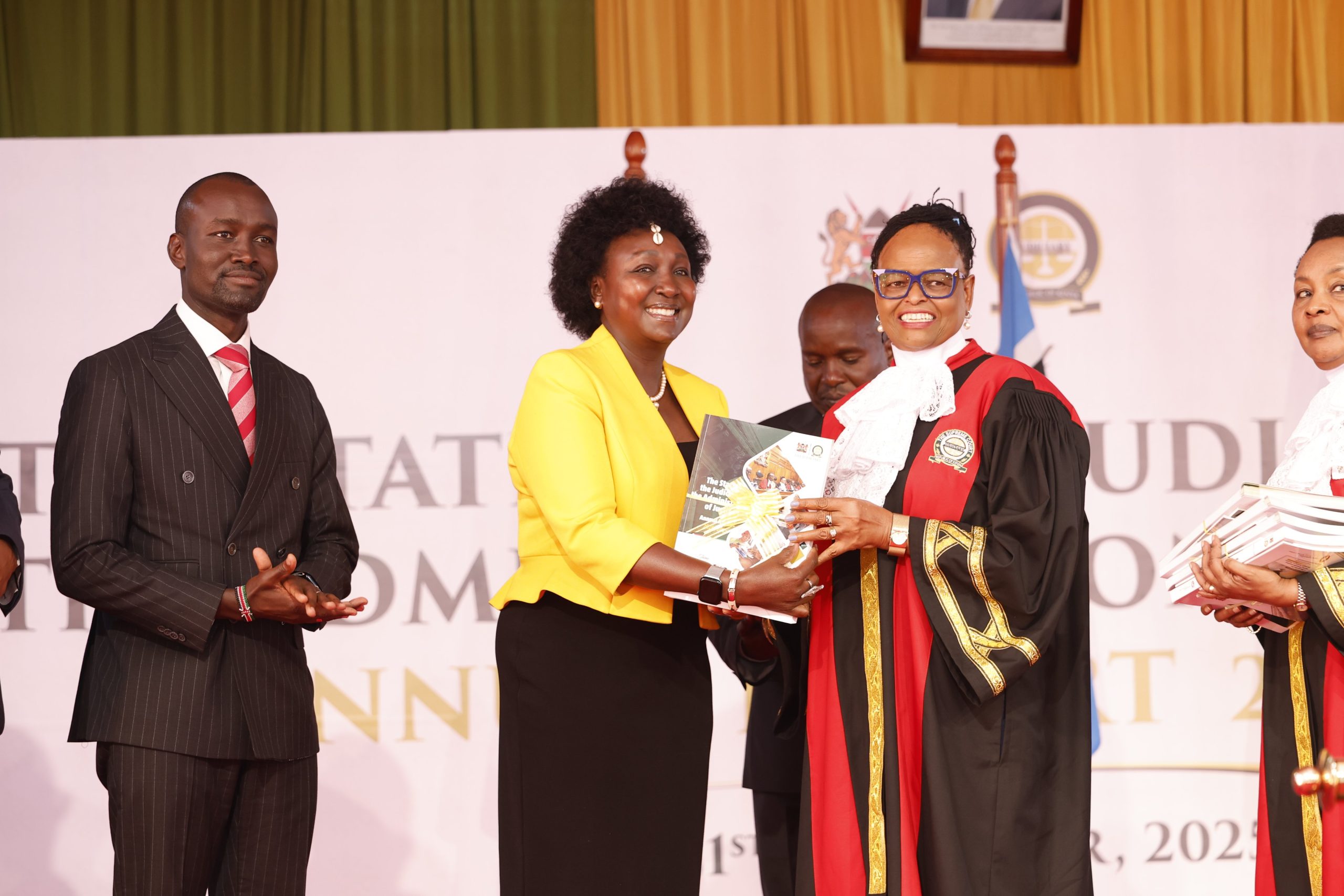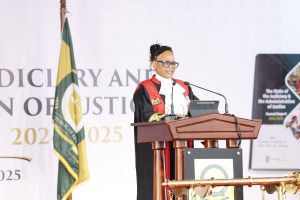Judiciary makes significant progress in building an accountable and people-centered justice system

NAIROBI. Friday, November 21, 2025 – Judiciary makes significant progress in building an accountable and people-centered justice system
The Judiciary has made significant progress in building an accountable, people-centered justice system through institutional reforms aimed at enhancing the enforcement of ethical standards, protecting the public from misconduct, Chief Justice Martha Koome has affirmed.
Speaking when she presented the State of the Judiciary and the Administration of Justice Report 2024/2025, themed “Enhancing Accountability and Public Trust in the Judiciary,”that was graced by Deputy President Prof Kithure Kindiki, the CJ disclosed that the Judiciary has strengthened institutional communication through the establishment of the Judiciary Spokesperson’s Office, operationalization of the Judiciary Call Centre, and held the inaugural Judiciary Dialogue Day.
CJ Koome acknowledged that access to justice also improved significantly during the last financial year through expansion of the Judiciary’s physical and digital footprint. “We continued to grow judicial presence across the country by operationalising new courts and sub-registries. These include a new Court of Appeal sub-registry in Garissa bringing the total number of the Court of Appeal’s sub-registries to six; two High Court stations in Isiolo and Makadara, and five additional High Court sub-registries, ensuring the presence of the High Court in all 47 counties.”
The Judiciary also operationalised six new Magistrates’ Courts, bringing the total number of Magistrates’ courts to 143 in 133 Constituencies. Three new Small Claims Courts were added, increasing the number of Small Claims Court to 40. The Environment and Land Court’s capacity was enhanced, by establishing a new Appeals Division in Nairobi.
The CJ further noted that the transition of the Retirement Benefits Appeals Tribunal to the Judiciary raised the number of tribunals under our administration to 27 out of 43 gazetted tribunals. Shared Services Centres for Tribunals were also established in Nairobi and Kisumu to enhance efficiency
In addition to expanding its footprints operations, the Judiciary further reinforced the reach of justice through mobile courts, where 59 mobile courts were in operation, which brought services to remote areas. Through these Mobile courts, the Judiciary registered 7,872 new cases and resolved 6,751 cases.
Further, The CJ pointed out that the Judiciary has expanded Court-Annexed Mediation (CAM) by establishing 14 new CAM registries, bringing the total number of CAM registries to 82 across the country; while Alternative Justice Systems (AJS) County Action Plans were launched in six additional counties bringing the total number of counties where the AJS Policy is being implemented to 10 counties at the end of the financial year. These alternative pathways reduce adversarial litigation, restore relationships, and reduce pressure on the formal court system.” the CJ observed.
CJ Koome said the Judiciary has continued to strengthen the integrity of our systems, deepen internal accountability, improve performance management, widen access to justice, and accelerate implementation of the Social Transformation through Access to Justice (STAJ) Blueprint.
Efficiency remained a hallmark of court operations in the last financial year, culminating in a historic Case Clearance Rate of 104 per cent, with 621,425 cases filed compared to 647,686 resolved in the year.
“Pending cases reduced by 3 per cent, while backlog, defined as cases older than one year, dropped by an impressive 30 per cent, especially at the High Court and Magistrates’ Courts,” the CJ revealed.
An analysis of case filings during the year revealed an 8 per cent overall decline in criminal cases and a 58 per cent increase in civil cases compared to the previous year. This increase in civil cases was largely driven by the Small Claims Court, which recorded a 58 per cent increase in case filings, reflecting its success as a transformative engine of access to justice for individuals and small businesses.
Through the Mahakama Popote initiative, the CJ said the Judiciary redistributed 19,089 cases from high volume courts to stations with lower caseloads, resulting in the resolution of 14,240 matters through this initiative – proving that digital innovation can democratise case management and reduce delays.
CJ Koome noted that digitisation has remained a major pillar of the Judiciary reform agenda with the accelerated automation of judicial services through expansion of the Case Tracking System, adoption of AI-enabled speech-to-text transcription, and enhancement of digital infrastructure to cover 177 court stations and offices nationwide. In addition, the Judiciary launched the Judiciary Mobile App which has enabled the improvement of accessibility of our services by enabling litigants to track cases, obtain updates, and access information in real time.
Chief Registrar the Judiciary Winfridah Mokaya who was among those spoke at the function noted that SOJAR is Judiciary’s annual accountability instrument for the public resources entrusted to it. She added that over the years, it has also become a strategic self-assessment tool through which the Judiciary measures the socio-economic impact of our programmes and calibrate institutional priorities.
On her part, Hon Evelyn Olwande of the Judicial Service Commission, noted the report is not merely a statutory requirement but an accountability instrument that serves as a mirror through which the institution reflects on its the performance, impact and transformation of the Judiciary, and equally, a compass that guides future priorities.
Alongside the SOJAR Report, the Judiciary also unveiled the STAJ Blueprint Simple Guide – a user-friendly companion that distils the core ideas, vision, and priorities of the Social Transformation through Access to Justice Blueprint into an accessible format for the public.
Ends/…







